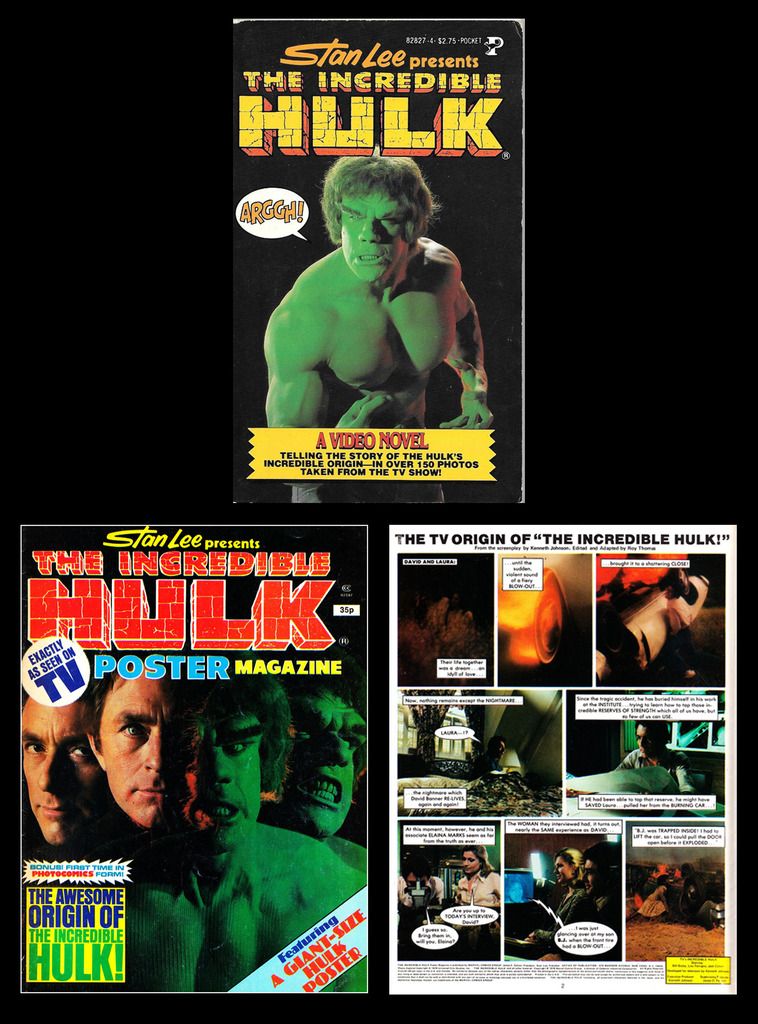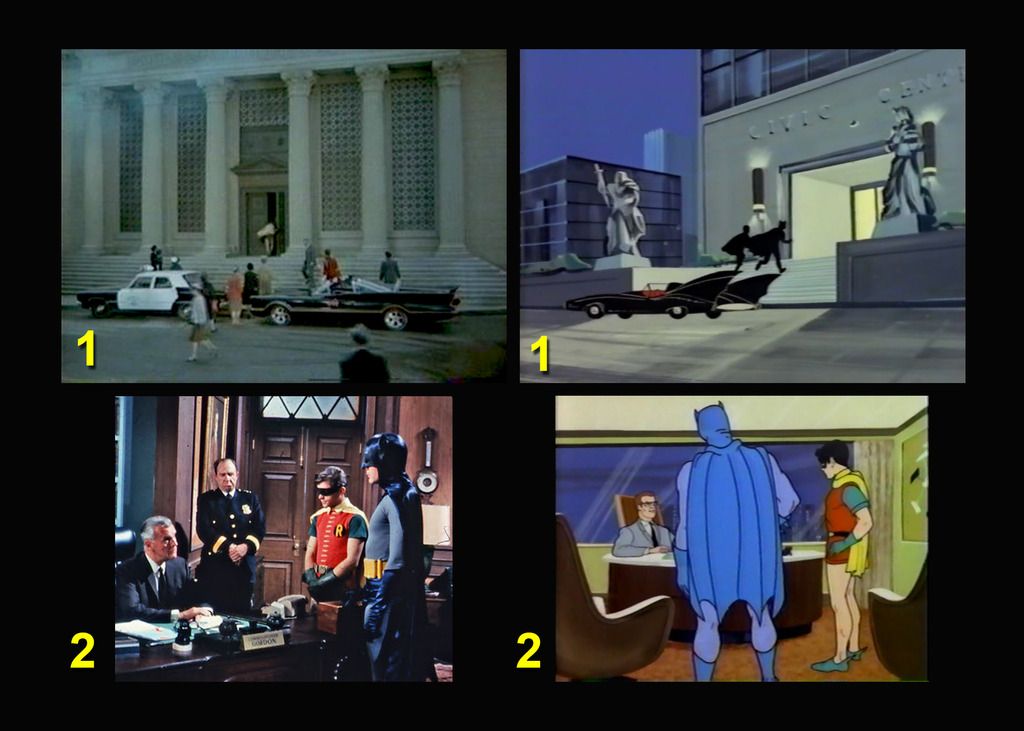If I recall, its either in the second TV movie or the series where he tells someone that he's not sure he can prove the Hulk didn't murder someone (assuming he's referring to McGee's claim that the Hulk killed Elaina Marks), so by then, Banner was all about the cure, and not understanding the metamorphosis in relation to his original research....
I'm not sure I understand your intent from the phrasing, but I always imagined that Banner was a smart enough cookie to ultimately come to the realization that it was his obsession with that research that led to his tragic condition and its consequences (e.g., Elaina's death).
It's interesting to note that even Banner would have had no clue as to what started the explosion, so he must have felt that he was ultimately responsible for Elaina's death.
The producers were on point in elevating Hulk's strength throughout the pilot; first, he flips a car over, then tears the steel chamber apart, and finally busts through thick, concrete walls, lifts slabs, etc. If anyone had concerns about showing how powerful a "young" TV Hulk could be, the pilot helped erase doubt.
I'll be quick to point out when series episodes seem to demote him down to circus strongman levels...from my recent aborted rewatch of the early episodes, I'm pretty sure that there were such moments.
Not an uncommon phenomenon in live action super-hero shows, particularly in those days of strictly practical, TV-budget effects. I remember catching some episodes of the Saturday morning live action
Shazam! on cable several years back...there was one scene in which he was forcing his way through a locked fence gate (that he could have easily flown over), and I was thinking, "It's taking
way too long for him to break that chain!"
One thing I'll say about that show in retrospect--the costume looked great.
Well, in the opening of season 2 ("Married") I think he's still having nightmares about Laura. The deaths of women he loves are so tied to his journey, that he recalls most (Caroline Fields from "Married" and Elaina) as his memory returns in "Mystery Man" part two.
IIRC, in "Married" he first transforms from the Laura memory because Caroline deliberately digs it out via hypnosis. The second time, he's having a nightmare about losing Caroline that connects Caroline's impending demise with Laura's. Both cases would fit fine with my theory of a subconscious blocking of the Laura nightmares, as there were extenuating circumstances bringing them back to the fore in "Married".
It's great that this show actually bears such thoughtful analysis. Quite a contrast to WW, which I couldn't even sit through more than a few episodes of when it was on Me.
But there would still be no resolution--but a new conflict. Even if McGee thought the Hulk was not in the lab at the time of the explosion, he would still would still think the damage he saw "must" be linked to the explosion. He would never blame himself, or think it was all some random accident. At the end of it all, in McGee's mind, Banner and/or the Hulk would be guilty.
I've always thought that if McGee had all the information, it would have at least put some doubt into his mind. In his imagination, it was the creature who was somewhere in the lab at that time that started the explosion in a more direct fashion. And the show gave us enough likable/sympathetic beats with McGee that I always thought that, had he gotten that far, he might, just might, have helped Banner rather than hounding him.
(Which is pretty similar to how things panned out with Gerard in
The Fugitive, though I didn't know that when I was watching TIH as a kid and imagining these things....)
That stands as one of the great single lines in any superhero adaptation. Eternally memorable.
I remember seeing that paraphrased early in a ca. 1978 Spidey comic. I don't know if his own show was still on the air when it came out, but that was the period when both his title and the Hulk's were carrying the "Marvel's TV Sensation!" blurb on their covers. Quoted from inexact memory, Spidey was swinging across town to a confrontation with JJJ, and said to himself, "And like that guy on TV says, he's not gonna like me when I'm angry!"
Which kind of speaks to the difference between the memorable qualities of Spidey's show vs. TIH, that comics Spidey was referencing the other guy's show!
The lab was completely destroyed after several large explosions, and McGee--being the only eyewitness--saw Banner run in the direction of the lab, never to emerge. Between his testimony and the severity of the fire, perhaps authorities reached the conclusion echoed by the the police sergeant in season three's "Broken Image"--that Banner was "burned to death." That's the official conclusion.
But there was nothing about that lab fire to suggest that it could completely incinerate all traces of a human being. And I don't know about 1977 forensics, but today the authorities could have traced the origin of the initial explosion to that closet. It was a point that was glossed over for purposes of setting up the series premise, but I'd think that they'd have to assume that Banner somehow got away from the scene, and would actually put an APB out on him for questioning at the very least.
Had the showmakers wanted to cover that base, they could have introduced a plot point about somebody else being at the site who wasn't supposed to be there, or that the research at that facility involved a male cadaver, with the authorities assuming that the badly-damaged remains were those of Banner. (Even then, methods like dental records probably could have set them straight....)
On the opposite end, the finale of Batman--only a year later--was just a deflated tire, waiting for ABC to replace it with whatever filled that slot in September of 1968.
The Ugliest Girl in Town (just because you got me curious)--Not even a one-season wonder, but a
half-season wonder...replaced in the slot by
The Flying Nun (which was moved from its 8:00 slot on the same night in the fall, a slot that was in turn filled by
That Girl, which had been on at 9:00 in the fall).
From the above-linked Wiki article:
In 2002, TV Guide ranked the series number 18 on its '50 Worst TV Shows of All Time' list.
You have to wonder if
Batman's rating were really
that bad that it was worth cancelling...but I guess the Caped Crusader's loss was Ann Marie's gain, as she got moved up to a better slot!






